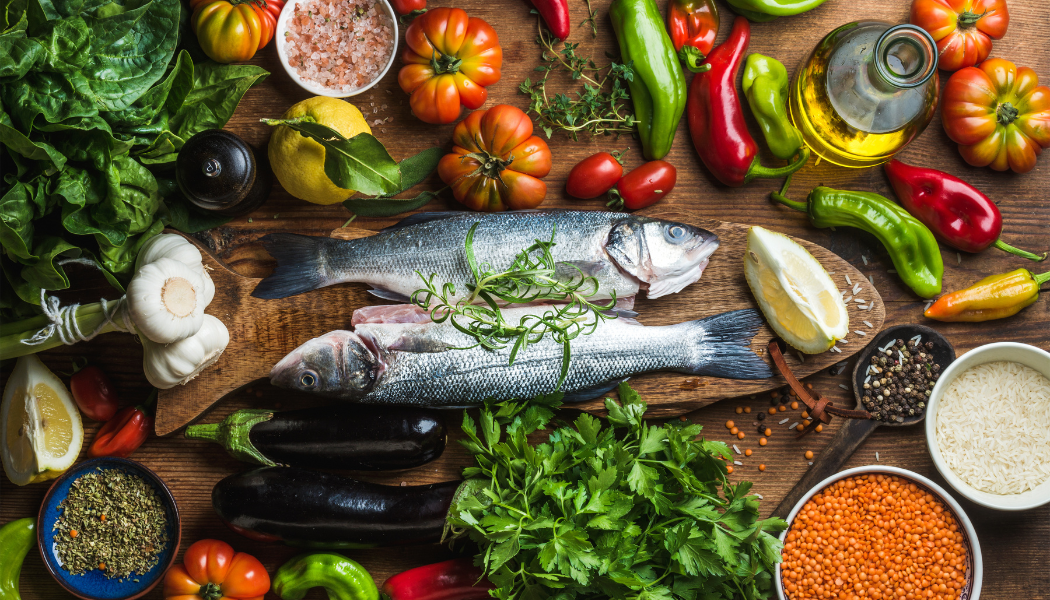Does the Mediterranean Diet Prevent Cancer?
 You may have heard about the many health benefits of a Mediterranean diet. This diet is rich in fish, olive oil, vegetables, whole grains, nuts, and legumes. Typically, the Mediterranean diet limits red meat, dairy, and alcohol consumption. There’s no doubt the popular diet can promote positive health outcomes, but can it prevent cancer?
You may have heard about the many health benefits of a Mediterranean diet. This diet is rich in fish, olive oil, vegetables, whole grains, nuts, and legumes. Typically, the Mediterranean diet limits red meat, dairy, and alcohol consumption. There’s no doubt the popular diet can promote positive health outcomes, but can it prevent cancer?
Research-backed Insights
Studies suggest that the Mediterranean diet is associated with a reduced risk of overall cancer mortality as well as a reduced risk of several cancer types. Including cancers of the colorectal, breast, stomach, pancreas, prostate, and lung.
Mediterranean Diet & Colorectal Cancer
In 2018, experts found that three key elements of the Mediterranean diet are most important for preventing the development of precancerous polyps. These elements include a diet high in fish and fruit and low in soft drinks. Researchers elaborate that each of these three elements was associated with an over 30% reduced odds of a person having an advanced, precancerous colorectal lesion when compared to people who did not eat any of the Mediterranean diet components.
Mediterranean Diet & Breast Cancer
After studying approximately 15,000 women in Greece for nearly a decade, researchers suggest that postmenopausal women who consume a traditional Mediterranean diet may have a lower breast cancer risk. This conclusion was reached by assessing participants’ diets using a questionnaire and a scoring method to determine to what extent the women followed a traditional Mediterranean diet. Over the course of the 10-year study, only 240 women were diagnosed with breast cancer.
Mediterranean Diet & Stomach Cancer
Another study followed a large cohort of men and women between the ages of 35 and 70 to determine the Mediterranean diet’s impact on the risk of stomach cancer. After analyzing data from nearly half a million individuals, the research team concluded that the diet lowered the risk of stomach cancer by one-third.
Mediterranean Diet & Pancreatic Cancer
The causes of pancreatic cancer remain uncertain. Factors that increase the risk of developing pancreatic cancer include:
- cigarette smoking
- increasing age
- certain dietary characteristics
- obesity
- diabetes, and
- chronic pancreatitis
Upon analyzing various combinations of healthy and unhealthy behaviors amongst pancreatic cancer patients, researchers found that those with the most healthy combination cut their risk of pancreatic cancer by more than 50%.
These results suggest that the risk of pancreatic cancer can be substantially reduced by:
- not smoking
- limiting alcohol intake
- maintaining a healthy weight
- engaging in regular physical activity, and
- Eating a diet rich in fruits, vegetables, whole grains, fish, and healthy fats such as olive oil and canola oil – much like the Mediterranean diet.
Mediterranean Diet & Prostate Cancer
After skin cancer, prostate cancer is the most common cancer in men in the United States. A team of researchers observed 410 men who were diagnosed with prostate cancer and issued a questionnaire regarding their food choices.
Participants were then grouped by high, medium, or low adherence to the diet. After adjustments for age and clinical characteristics, researchers saw a significant association between a high baseline diet score and a lower risk of cancer grade progression. For every one-point increase in the Mediterranean diet score, researchers observed a 10% lower risk of progression.
Mediterranean Diet & Lung Cancer
Smoking is the number one risk factor for lung cancer. Ceasing tobacco use can significantly reduce one’s risk. However, research suggests that the Mediterranean diet may also help lower one’s risk.
In 2016, researchers compared the risk of developing lung cancer amongst a group of people who regularly smoke tobacco but eat different diets. They found that people eating the Mediterranean diet had a lower risk than people with less healthy eating patterns. The researchers stated that the only caveat to the Mediterranean diet is the consumption of red wine, which is not an element meant to reduce cancer risk.
So what does this tell us?
Researchers have, without a doubt, been fascinated by the impact of the Mediterranean diet in regards to cancer risk. There is a clear correlation between this diet and reduced risk of various cancers.
However, each study has drawn similar conclusions about how people can best reap the benefits of this diet. The critical aspect is more about including a wide array of fruits and vegetables than the hard and fast rules often seen in fad diets.
This diet also highlights the importance of healthy fats like olive oil, nuts, and fish, over less healthy fats like those found in fried foods, bacon, and dairy.
Ready to incorporate more cancer-fighting recipes into your week? Check out National Foundation for Cancer Research’s Cancer-Fighting Food blog for tips, tricks, and healthy recipes.











